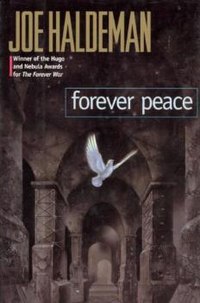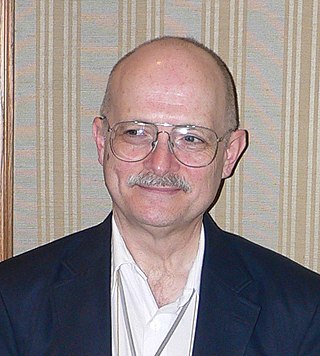
Vernor Steffen Vinge was an American science fiction author and professor. He taught mathematics and computer science at San Diego State University. He was the first wide-scale popularizer of the technological singularity concept and among the first authors to present a fictional "cyberspace". He won the Hugo Award for his novels A Fire Upon the Deep (1992), A Deepness in the Sky (1999), and Rainbows End (2006), and novellas Fast Times at Fairmont High (2001) and The Cookie Monster (2004).

Gregory Dale Bear was an American writer and illustrator best known for science fiction. His work covered themes of galactic conflict, parallel universes, consciousness and cultural practices, and accelerated evolution. His last work was the 2021 novel The Unfinished Land. Greg Bear wrote over 50 books in total. He was one of the five co-founders of San Diego Comic-Con.

Jack McDevitt is an American science fiction author whose novels frequently deal with attempts to make contact with alien races, and with archaeology or xenoarchaeology. Most of his books follow either superluminal pilot Priscilla "Hutch" Hutchins or galactic relic hunters Alex Benedict and Chase Kolpath. McDevitt has received numerous nominations for Hugo, Nebula, and John W. Campbell awards. Seeker won the 2006 Nebula Award for Best Novel.

Glen David Brin is an American science fiction author. He has won the Hugo, Locus, Campbell and Nebula Awards. His novel The Postman was adapted into a 1997 feature film starring Kevin Costner.
The Heechee Saga, also known as the Gateway series, is a series of science fiction novels and short stories by Frederik Pohl. The Heechee are an advanced alien race that visited the Solar System hundreds of millennia ago and then mysteriously disappeared. They left behind bases containing artifacts, including working starships, which are discovered and exploited by humanity.

Gene Rodman Wolfe was an American science fiction and fantasy writer. He was noted for his dense, allusive prose as well as the strong influence of his Catholic faith. He was a prolific short story writer and novelist, and won many literary awards. Wolfe has been called "the Melville of science fiction", and was honored as a Grand Master by the Science Fiction and Fantasy Writers of America.

Joe William Haldeman is an American science fiction author.
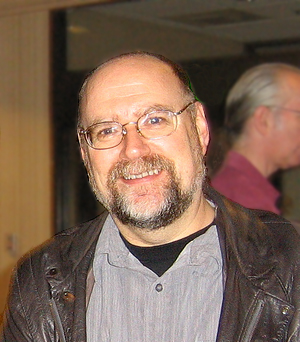
Robert Charles Wilson is an American-Canadian science fiction author.

Michael Swanwick is an American fantasy and science fiction author who began publishing in the early 1980s.
The Forever War series is a series of science fiction novels by Joe Haldeman. Not all of them take place in the same future universe.
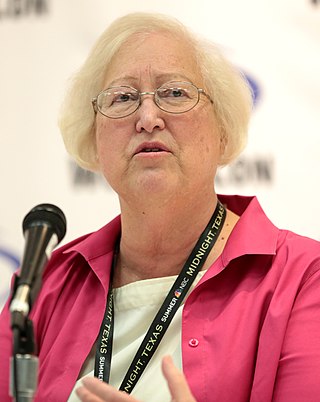
Constance Elaine Trimmer Willis, commonly known as Connie Willis, is an American science fiction and fantasy writer. She has won eleven Hugo Awards and seven Nebula Awards for particular works—more major SF awards than any other writer—most recently the "Best Novel" Hugo and Nebula Awards for Blackout/All Clear (2010). She was inducted by the Science Fiction Hall of Fame in 2009 and the Science Fiction Writers of America named her its 28th SFWA Grand Master in 2011.
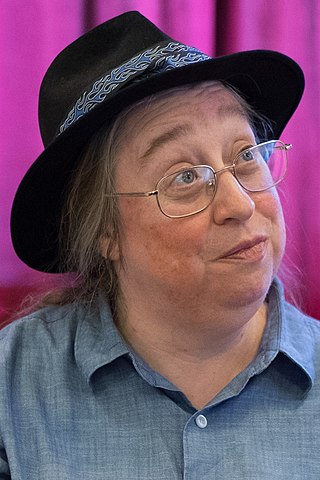
Jo Walton is a Welsh-Canadian fantasy and science fiction writer and poet. She is best known for the fantasy novel Among Others, which won the Hugo and Nebula Awards in 2012, and Tooth and Claw, a Victorian-era novel with dragons which won the World Fantasy Award in 2004. Other works by Walton include the Small Change series, in which she blends alternate history with the cozy mystery genre, comprising Farthing, Ha'penny and Half a Crown. Her fantasy novel Lifelode won the 2010 Mythopoeic Award, and her alternate history My Real Children received the 2015 Tiptree Award.

Nancy Anne Kress is an American science fiction writer. She began writing in 1976 but has achieved her greatest notice since the publication of her Hugo- and Nebula-winning novella Beggars in Spain (1991), which became a novel in 1993. She also won the Nebula Award for Best Novella in 2013 for After the Fall, Before the Fall, During the Fall, and in 2015 for Yesterday's Kin. In addition to her novels, Kress has written numerous short stories and is a regular columnist for Writer's Digest. She is a regular at Clarion Workshops. During the winter of 2008/09, Nancy Kress was the Picador Guest Professor for Literature at the University of Leipzig's Institute for American Studies in Leipzig, Germany.

Kate Wilhelm was an American author. She wrote novels and stories in the science fiction, mystery, and suspense genres, including the Hugo Award–winning Where Late the Sweet Birds Sang. Wilhelm established the Clarion Workshop along with her husband Damon Knight and writer Robin Scott Wilson.
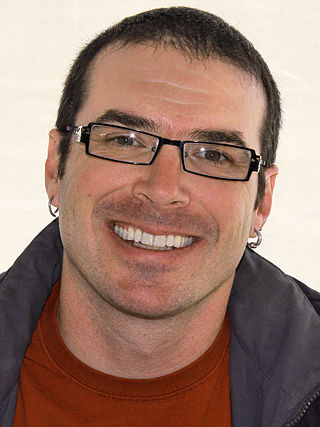
Paolo Tadini Bacigalupi is an American science fiction and fantasy writer. He has won the Hugo, Nebula, John W. Campbell Memorial, Compton Crook, Theodore Sturgeon, and Michael L. Printz awards, and has been nominated for the National Book Award. His fiction has appeared in The Magazine of Fantasy & Science Fiction, Asimov's Science Fiction, and the environmental journal High Country News. Nonfiction essays of his have appeared in Salon.com and High Country News, and have been syndicated in newspapers, including the Idaho Statesman, the Albuquerque Journal, and The Salt Lake Tribune.

Pyr was the science fiction and fantasy imprint of Prometheus Books, launched in March 2005 with the publication of John Meaney's Paradox. In November 2018 it was sold to Start Publishing.

Mary Robinette Kowal is an American author, translator, art director, and puppeteer. She has worked on puppetry for shows including Jim Henson Productions and the children's show LazyTown. As an author, she is a four-time Hugo Award winner, and served as the president of the Science Fiction and Fantasy Writers of America from 2019-2021.
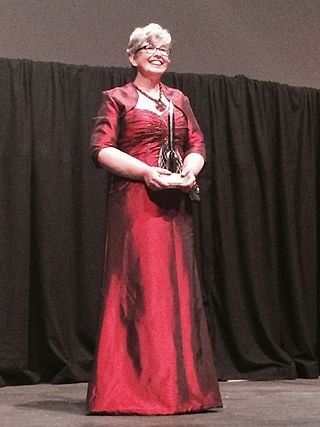
Ann Leckie is an American author of science fiction and fantasy. Her 2013 debut novel Ancillary Justice, which features artificial consciousness and gender-blindness, won the 2014 Hugo Award for "Best Novel", as well as the Nebula Award, the Arthur C. Clarke Award, and the BSFA Award. The sequels, Ancillary Sword and Ancillary Mercy, each won the Locus Award and were nominated for the Nebula Award. Provenance, published in 2017, and Translation State, published in 2023, are also set in the Imperial Radch universe. Leckie's first fantasy novel, The Raven Tower, was published in February 2019.
A list of works by, or about, the American science fiction author Larry Niven.
